- Home
- Michael Dobbs
The Final Cut
The Final Cut Read online
MICHAEL DOBBS
Michael Dobbs has carved out a unique niche as the country's leading political thriller writer. His first immensely successful novel. House of Cards, has been followed by a string of bestsellers: Wall Games, Last Man to Die, To Play the King and The Touch of Innocents. His most famous creation, the character of Francis Urquhart, has been immortalized by lan Richardson in the award-winning BBC TV series.
For two decades Michael Dobbs has been at the right hand of political controversy. As one critic wrote: 'He is the sort of operator who seems to be precisely where the action is at various moments in history.' In 1979 he was at Mrs Thatcher's side as she took her first step into Downing Street as Prime Minister, and he has been both Chief of Staff and Deputy Chairman of the Conservative Party. At other times he spends a quiet life with his wife and two sons in rural Dorset.
THE FINAL CUT
'The magnificent new novel from Michael Dobbs, the man who knows Westminster from the inside . . . This book has it all - action, passion and wonderfully wicked double-dealing in the corridors of power.'
Sunday Express
'Urquhart is a magnificent creation.'Independent
'It's that man again ... In Francis Urquhart he has created a true political icon. Dobbs lays fair claim to being the Quentin Tarantino of pulp political fiction.'
Glenda Jackson MP, Sunday Times
'A rollicking good tale.'
Edwina Currie MP, European Magazine
'Sure as eggs is eggs, Dobbs demonstrates his unrivalled
expertise.'Gerald Kaufman MP, Daily Telegraph
'A supreme last trick.'Daily Express
'Mischievous and horribly convincing fiction ... It is
fine fun.'Financial Times
'A rollicking good yarn that is hard to put down. The
Final Cut is a great book.'Melbourne Herald-Sun
'Riveting. The ingredients for pace and passion are all
in place . . . play and counter play; double- and treble-
cross. Fascinating in the extreme.'Irish Times
'The Final Cut is everything that fans of the author's
earlier work would have hoped for. I had trouble
putting the book down, and would have read it in one
session instead of two if I hadn't decided to get some
sleep at 2.15 a.m.'Single Life Magazine, Australia
'He's back! Francis Urquhart, the Prime Minister
everyone loves to hate: the scheming, conniving mon-
ster of Westminster who makes Margaret Thatcher
look like an old softie.'Today
'A grand finale. Urquhart is a brilliant character. Dobbs brings the cut and thrust of politics brilliantly to life.'
Yorkshire Evening Post
'Francis Urquhart is a fictional character cut from the
finest cloth. The Final Cut is beautifully and melodramatically executed.'City Life
HOUSE OF CARDS
'This blood-and-thunder tale, lifelike and thoroughly
cynical, certainly carries the ring of authenticity ... a
great triumph.'Anthony Howard, Independent
'Here is a political thriller writer with a marvellous inside track knowledge of government. House of Cards is fast-moving, revelatory and brilliant.' Daily Express
TO PLAY THE KING
'Michael Dobbs has an uncanny knack of forecasting the future. A fascinating read and a conclusion that would send a chill through Buckingham Palace.'
Sunday Express
'With a friend like Michael Dobbs, who on earth needs enemies? His timing is again impeccable. A good romp, and gloriously cheeky. Dobbs' books grab because of their authenticity - the man knows his stuff.'
The Times
THE TOUCH OF INNOCENTS
T ended up sitting up till the early hours, and for the next few days scenes and people kept going round in my head. You can't ask for more.'
Jeremy Paxman, Mail on Sunday
LAST MAN TO DIE
'Truly the great escape . . . quite simply, a good old-
fashioned adventure that rattles along to a cataclysmic
finale.'Daily Mail
By Michael Dobbs
HOUSE OF CARDS
WALL GAMES
LAST MAN TO DIE
TO PLAY THE KING
THE TOUCH OF INNOCENTS
THE FINAL CUT
MICHAEL DOBBS
The Final Cut
HarperCollinsPublishers
HarperCollinsPublishers 77-85 Fulham Palace Road, Hammersmith, London W6 8JB
This paperback edition 1995
135798642
First published in Great Britain by HarperCollinsPublishers 1995
Copyright © Michael Dobbs 1995
The Author asserts the moral right to be identified as the author of this work
ISBN 0 00 647709 7
Set in Trump Medieval by Rowland Phototypesetting Ltd Bury St Edmunds, Suffolk
Printed in Great Britain by Harper Collins Manufacturing Glasgow
All rights reserved. No part of this publication may be reproduced, stored in a retrieval system, or transmitted, in any form or by any means, electronic, mechanical, photocopying, recording or otherwise, without the priorpermission of the publishers.
This book is sold subject to the condition that it shall not, by way of trade or otherwise, be lent, re-sold, hired out or otherwise circulated without the publisher's prior consent in any form of binding or cover other than that in which it is published and without a similar condition including this condition being imposed on the subsequent purchaser.
For David, Peter and Linda. The Family Dobbs.
'That we shall die, we know; 'tis but the time
And drawing days out, that men stand upon,'
William Shakespeare, Julius Caesar
THE FINAL CUT
PROLOGUE
Troodos Mountains, Cyprus - 1956
It was late on an afternoon in May, the sweetest of seasons in the Troodos, beyond the time when the mountains are muffled beneath a blanket of snow but before the days when they serve as an anvil for the Levantine sun. The spring air was filled with the heavy tang of resin and the sound of the breeze being shredded on the branches of great pines, like the noise of the sea being broken upon a pebbled shore. But this was many miles from the Mediterranean, almost as far as is possible to get from the sea on the small island of Cyprus.
A colony of martins tumbled through the trees like acrobats, driven desperate by the demands of the nestlings. These were good times, a season of abundance even in the mountains. For a few weeks in spring the dust of crumbling rock chippings which passes for soil becomes a treasury of wild flowers -erupting bushes of purple-flowered sword lily, blood-dipped poppies, alyssum, the leaves and golden heads of which in ancient times were supposed to effect a cure for madness.
Yet nothing would cure the madness that was about to burst forth on the side of the mountain.
George, fifteen and almost three-quarters, prodded the donkey further up the mountain path, oblivious to the beauty. His mind had turned once again to breasts, it was a topic which seemed to demand most of his time nowadays, depriving him of sleep, causing him not to hear a word his mother said, making him blush whenever he looked at a woman, which he always did straight between her breasts. They had an energy source all their own which dragged his eyes towards them, like magnets, no matter how hard he tried to be polite. He never seemed to remember what their faces looked like, his eyes rarely strayed that far; he'd marry a toothless old hag one day. So long as she had breasts.
If he were to avoid insanity or, even worse, the monastery, somehow he would have to do it, he decided. Do IT. Before he was fifteen and three-quarters. In two weeks
' time.
He was also hungry. On the way up he and his younger brother, Eurypides, thirteen and practically one half, had stopped to plunder honey from the hives owned by the old crone Chlorides, who had mean eyes like a bird and horribly gnarled fingers -she always accused them with that noxious breath of hers of robbing her, whether they had or not, so a little larceny used up some of their extensive credit. Local justice. George had subdued the bees with the smoke from a cigarette he had brought along specifically for the purpose. He'd almost gagged - he hadn't taken to cigarettes yet, but would, he promised himself. Soon. As soon as he had had IT. Then, maybe, he could get to sleep at nights.
Not far to go. The terraced ledges where a few wizened olive trees clung to the rock face were now far behind, they were already two kilometres above the village, less than another two to climb. The light had started to soften, it would be dark in a couple of hours and George wanted to be home by then. His mother was preparing stifado with the tiny onions he liked; George decided he would also ask for a glass of her black wine, so thick he could still taste the mud. He'd've earned it.
He gave the donkey another fierce prod. The animal, beneath its burden of rough-hewn wooden saddle and bulging cloth panniers, was finding difficulty in negotiating the boulder-strewn trail and cared nothing for such encouragement. The beast expressed its objection in the traditional manner.
'Not over my school uniform, dog meat!' Eurypides sprang back in alarm and, too late, cursed. There was a beating if he did not attend school in uniform, though school was no more than a crumbling one-room shack stuck behind the church. Even in a poor mountain village they had standards.
And guns.
Like the two Sten guns wrapped in sacking at the bottom of one of the panniers which they were delivering, along with the rest of the supplies, to their older brother. George envied his older brother, hiding out with five other EOKA fighters in a mountain lair, descending to do damage to the British and their informants before disappearing once more like the mountain mist.
EOKA. Ethniki Organosis Kyprion Agoniston -the National Organization of Cypriot Fighters - who for a year had been trying to blast open the closed colonial minds of their British rulers and force them to grant the island independence. They were terrorists to some, liberation fighters to others. To George, great patriots. With every part of him that was not concerned with sex he wanted to join them, to be one of them, to fight the enemies of his country and his people and to be able to regard himself as a real man. But frustration piled upon youthful frustration, for the High Command was emphatic that no one under the age of eighteen could take up arms. He would have lied, but there was no point, not in a village where everyone knew even the night of his conception. Just before Christmas 1939. The war against the Germans was only a few months old and his father's brother George had volunteered for the Cyprus Regiment of the British Army. Like many young Cypriots he had wanted to join the fight for freedom and liberty in Europe which, once won, would surely bring their own release. Or so they had thought. His uncle's farewell celebration had been a long night of feasting and loving, and he had been conceived.
And Uncle George never came back.
It had been impressed upon the younger George that he had much to live up to, to honour the memory of a brave, long-lost uncle, brother, friend, a memory grown more glorious with time. George idolized the uncle he had never known, but he was only fifteen and almost three-quarters and instead of marching in heroic footsteps was reduced to delivering messages and supplies.
'Did you really do it with Vasso? Seriously, George.'
'Course, stupid. Several times!' George lied, filling his chest with wind. He was beginning to discover that one lie piled upon another, and each time the subject of their second cousin Vasso was raised he was forced to clamber still higher up his rickety edifice of falsehoods.
'What was it like?' Eurypides wriggled inside his soiled school uniform, anxious not to display too much ignorance yet unable to resist the voyage of discovery.
'They were like peponia, soft melons of flesh,' George exclaimed, gyrating his hands in demonstration. He wanted to expand but couldn't; Vasso had taken him no further than the buttons of her blouse where he had found not the soft fruits he had anticipated but small, hard breasts with nipples like plum stones. He was sure it was her fault. Next time would be better.
Eurypides giggled in anticipation, but didn't believe. 'You didn't, did you?' he accused. George felt his carefully constructed edifice wobbling beneath him.
'Did.'
'Didn't.'
'Psefti.'
'Malaka!'
Eurypides threw a stone and George jumped, stumbling on a loose rock and falling flat on his rump, fragments of his dream scattered around him. Eurypides' squeals of laughter, by turns childishly high pitched and pubescent gruff, filled the valley and cascaded like acid over his brother's pride. George felt humiliated, he needed something to restore his flagging esteem. Perhaps he would inflict some form of great physical peril on his younger brother, or devise some other means of establishing his seniority. Suddenly he knew exactly how.
George loosened the string neck of one of the panniers and reached deep inside, beneath the oranges and side of smoked pork, until his fingers grasped a cylindrical parcel of sacking. Carefully he withdrew it, then a second slightly smaller bundle. In the shadow of a large boulder he lay both on the carpet of soft pine needles, gently removed the wrappings, and Eurypides gasped. It was his first trip on the supply run, he hadn't been told what they were carrying, and his eyes grew large with the knowledge. Staring up at him from the sacking was the dull grey metal of a Sten gun, modified with a folding butt to make it more compact for smuggling. Alongside it were three ammunition mags.
George was delighted with the effect, but he had further to go. Within a few seconds, as his older brother had taught him the week before, he had prepared the Sten, a lightweight machine gun, swinging and locking into position the skeletal metal butt, engaging one of the magazines. He fed the first bullet into the chamber. It was ready.
'Didn't know I could use one of these, did you?' He felt much better, authority re-established. He wedged the gun in the crook of his elbow and adopted a fighting pose, raking the valley with a burst of pretend-fire, doing to death a thousand different enemies cowering in their castle before ordering his silent army of fighters to storm the ramparts and finish off the rest. Then he turned on the donkey, despatching it with a volley of whistled sound-effects. The beast, unaware of its fate, continued to rip at a clump of tough grass.
'Let me, George. My turn,' his brother pleaded.
George, the Commander, shook his head.
'Or I'll tell everyone about Vasso,' Eurypides bargained.
George spat. He liked his little brother who, although only thirteen and practically one half, could already run faster and belch more loudly than almost anyone in the village. Eurypides was also craftier than most of his age, and more than capable of a little blackmail. George had no idea precisely what Eurypides was planning to tell everyone about him and Vasso, but in his fragile emotional state any morsel was already too much. He handed over the weapon.
As Eurypides' hand closed around the rubberized grip and his finger stretched for the trigger, the gun barked, five times, before the horrified boy let it fall to the floor.
'The safety!' George yelped, too late. He'd forgotten. The donkey gave a violent snort of disgust and cantered twenty yards along the path in search of less disturbed grazing.
The main advantages of the 9 mm Sten gun are that it is light and capable of reasonably rapid fire; it is neither particularly powerful nor considered very accurate. And its blow-back action is noisy. In the crystal air of the Troodos, where the folds of the mountains spread away from Mount Chionistra into mist-filled distances, sound carries like a petrel on the wing. It was scarcely surprising that the British army patrol heard the bark of the Sten gun; what was more remarkable was the fact that the patrol had be
en able to approach so closely without George or Eurypides being aware of their presence.
There were shouts from two sides. George sprang to retrieve the donkey but already it was too late. A hundred yards beneath them, and closing, was a soldier in khaki and a Highland bonnet who was waving a .303 in their direction. George's immediate emotion was one not of apprehension but of envy; the fresh-faced Scotsman looked scarcely older than was he.
Eurypides was already running; George delayed only to sweep up the Sten and two remaining magazines. They ran up the mountain to where the trees grew more dense, brambles snatching at their legs, the pumping of their hearts and their rasping breath drowning any sound of pursuit until they could run no further. They slumped across a rock, wild eyes telling each other of their fear, their lungs burning.
Eurypides was first to recover. 'Mum'll kill us for losing the donkey,' he gasped.
They ran a little more until they stumbled into a shallow depression in the ground which was well hidden by boulders, and there they decided to hide. They lay face down in the centre of the rocky bowl, an arm across each other, listening.

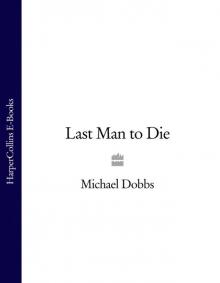 Last Man to Die
Last Man to Die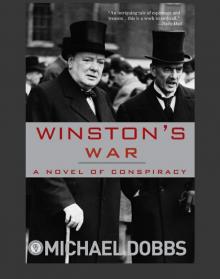 Winston's War
Winston's War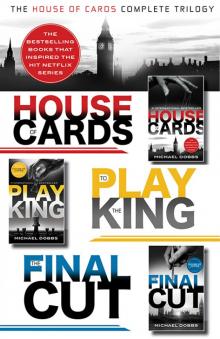 The House of Cards Complete Trilogy
The House of Cards Complete Trilogy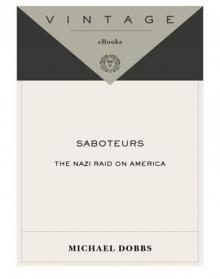 Saboteurs
Saboteurs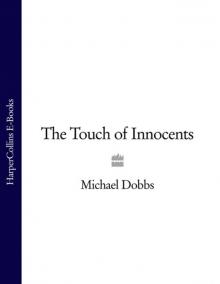 The Touch of Innocents
The Touch of Innocents WC02 - Never Surrender
WC02 - Never Surrender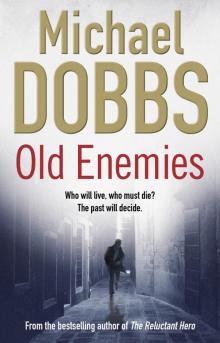 Old Enemies
Old Enemies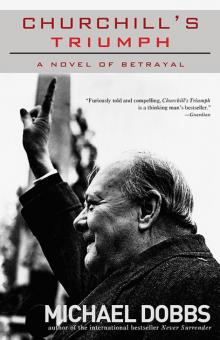 Churchill's Triumph
Churchill's Triumph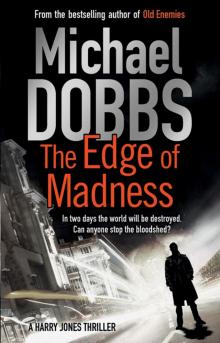 The Edge of Madness
The Edge of Madness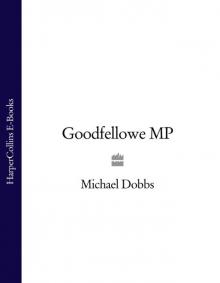 Goodfellowe MP
Goodfellowe MP The Final Cut
The Final Cut Whispers of Betrayal
Whispers of Betrayal Churchill's Hour
Churchill's Hour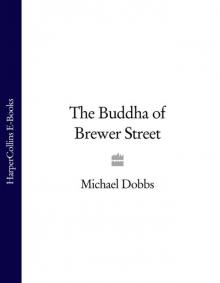 The Buddha of Brewer Street
The Buddha of Brewer Street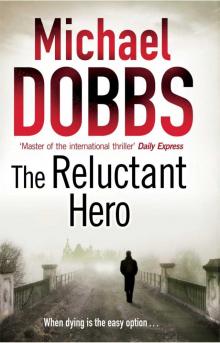 The Reluctant Hero
The Reluctant Hero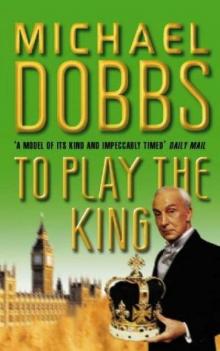 To Play the King
To Play the King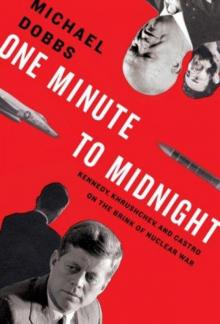 One minute to midnight
One minute to midnight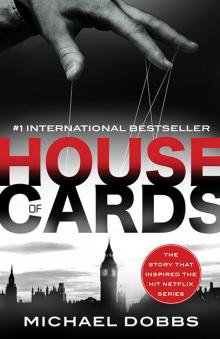 House of Cards
House of Cards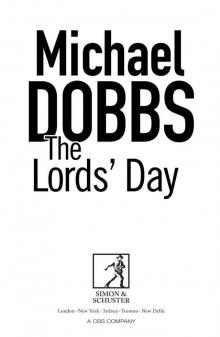 The Lords' Day (retail)
The Lords' Day (retail)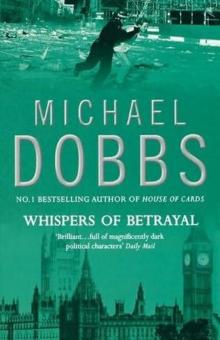 Whispers of betrayal tg-3
Whispers of betrayal tg-3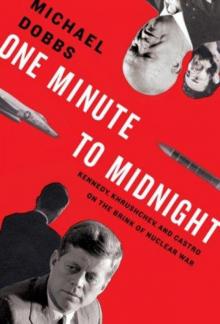 One minute to midnight: Kennedy, Khrushchev, and Castro on the brink of nuclear war
One minute to midnight: Kennedy, Khrushchev, and Castro on the brink of nuclear war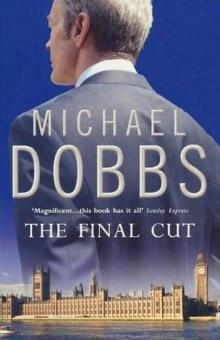 The Final Cut fu-3
The Final Cut fu-3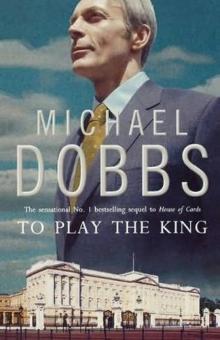 To play the king fu-2
To play the king fu-2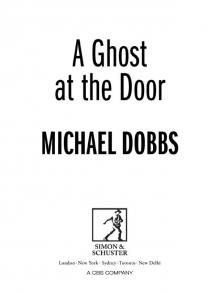 A Ghost at the Door
A Ghost at the Door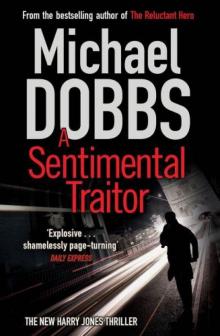 A Sentimental Traitor
A Sentimental Traitor